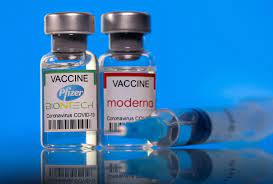In the next few days, the US government will supply 10 million vaccines to South Africa and Nigeria.
5.6 million Pfizer doses will be going to South Africa and 4 million Moderna doses will be heading Nigeria’s way.
This was revealed by Dana L. Banks, US Special Assistant to the President and Senior Director for Africa at the National Security Council, at a virtual press conference for African journalists on Wednesday.
According to banks, the deliveries are part of a pledge by President Biden to share 80 million doses globally–with about 25 million doses expected to arrive in 49 African states.
“We have been, over the past three weeks, working through the African Union and COVAX delivering first rounds, in some cases second rounds, of doses to our African partners. And just today, we are happy to announce that we will be sending over 5 million doses to South Africa as well as 4 million – 5 million doses – over 5 million doses to South Africa of Pfizer vaccines as well as 4 million doses of Moderna vaccine to Nigeria.
“So we’re very excited about that and we hope that these will go a long way in helping to provide safety and health security for the people of Nigeria and South Africa, which will then enable them to get back to their regular activities, their economic activities, and help them to build back better,” She said.
The United States is ramping up vaccine deliveries to Africa as a third wave of the pandemic continues to accelerate across the continent.
Vaccine availability in Africa has been hampered by a factor called ‘vaccine nationalism’, which has seen wealthy nations snapping up excess doses of available vaccines for their own populations.
So far, only less than 1 percent of Nigerians have so far received their first dose of COVID-19 vaccine.
According to Faisal Shuaib, the Executive Director National Primary Health Care Development Agency (NPHCDA), as of June 15, 2021, a total number of 1,978,808 targeted eligible Nigerians had partaken in vaccination against the Virus.
This represents 1.9 doses of vaccines per 100 people.













